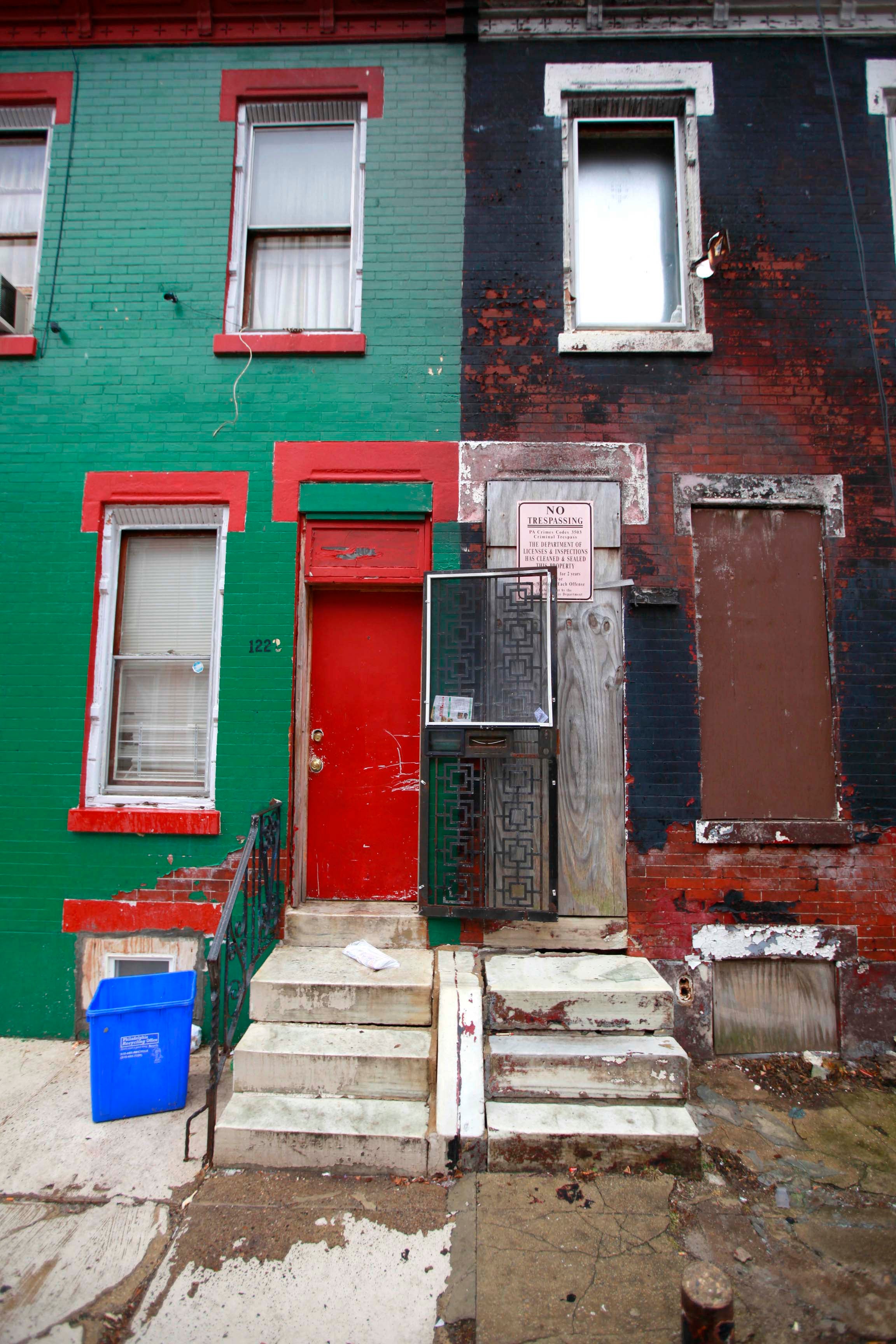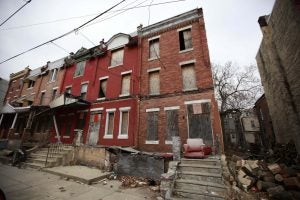Inquirer / PlanPhilly tax delinquency chat with Patrick Kerkstra and Kevin Gillen

This is the transcript from the live chat session with journalist Patrick Kerkstra and University of Pennsylvania urban economist, Kevin Gillen at noon on Wednesday. The subject was “Ravaged By Neglect, The Delinquency Crisis,” on the city’s failure to deal with delinquent properties and their toll on neighborhoods. Gillen did the analysis at the core of the yearlong Inquirer/PlanPhilly project.
|
|
Patrick Kerkstra:
Thanks Zack. We didn’t time this series, but it does seem given the transition to AVI that delinquency is particularly relevant question now.
|
|
Patrick Kerkstra:
Everyone, joining me today is Kevin Gillen, PhD, the economist who performed the economic analysis evaluating the impact of delinquency on property values. He’s the leading authority on property values in the region, and he’s here to take your questions as well.
|
|
Kevin Gillen:
Thanks, Patrick. Great to be here!
|
|
|
Patrick Kerkstra:
Kevin – One question I’ve heard from readers about your analysis is whether it’s confusing correlation with causation. In other words, does delinquency really depress property values? Or is simply associated with property values already in decline? How did you analysis account for that?
|
|
Kevin Gillen:
Great question, EJW. The delinquency rate is a critical factor in determining what our eventual new property tax rate will be under AVI. Since our delinquency rate is currently so high, that means that other taxpayers have to make up the difference in order to hit our revenue targets. Not only is this unfair, but it also means our average tax burden is higher than it would be otherwise–which is a drag on our economy and image.
|
|
|
Patrick Kerkstra:
Guest: It remains to be seen how Council will react to the mayor’s request for more funding for the revenue department,. Council President Clarke told me yesterday that he wouldn’t support more funding for the department without an increase in anticipated delinquent collections. He wants to see Return on Investment, as he put it. That said, council is anxious to see this situation improve, and more money could certainly help. It all depends on how well that money is spent, of course.
|
|
|
Kevin Gillen:
Patrick, in general delinquency is initially more of a symptom than a disease. Neighborhoods that fall into disfavor see their values go down, which leads owners to disinvest and under-maintain their properties. But, this in turn spurs more delinquencies as owners don’t want to throw “good money after bad” in maintaining their homes. So, delinquencies then start to become part of the disease. In short, delinquencies may not be the initial cause of a neighborhood’s decline, but the data is very clear that they can accelerate and amplify the decline.
|
|
Patrick Kerkstra:
Stefanie: Great question. It depends on what your goal is. If the aim is short term collections, then the city’s current approach – targeting property owners most likely to pay – makes sense. If your goal is longer term community revitalization and improvement, then you should be targeting those delinquent properties that create the most problems for their neighbors. If the aim is to limit foreclosures on property owners, then you could pursue the very large number of investors who own delinquent property. It’s worth remembering that most other cities take an all of the above approach, and go after all property owners who are in arrears, usually within two years.
|
|
|
Kevin Gillen:
Bakers Dozen: I don’t know that OPA will be releasing the specifics of their methodology in how they set the AVI assessments. I can tell you that its a combination of statistical modeling using recent sales and the personal judgment of the appraisers that work at OPA. Two major challenges to doing assessments in Philadelphia are that 1) the real estate in this city is very old, and appraisers don’t have access to the original building plans describing the number of beds and baths in the interior, so they often have to guess. And 2) Uniformity of assessments is every bit as much of an objective as their Accuracy. It’s important that assessments not vary wildly from property to property or block to block, even though sales prices often do. This forces OPA to often make a trade-off between accuracy and uniformity. Their are neighborhoods in Philly where you can get one, but only at the expense of the other.
|
|
Patrick Kerkstra:
Ted: as anyone in city government will tell you, resources are very limited right now. The city doesn’t have the ability to make massive new investments in redevelopment (like, say, Mayor Street did – with mixed results – in the Neighborhood Transformation Initiative). So the Nutter administration is pursuing strategies that try to give communities the tools they need to improve their own neighborhoods. PhillyRising is perhaps the best example of this. It’s low cost, and has had some success. Rolling it out on a citywide basis might help. |
|
|
Patrick Kerkstra:
Michael: we tracked property tax collections back to 1980. The fact is, collections in Philadelphia have always been low, relative to other cities. But the recent trend line is really bad. Collections faltered further in the Street administration, and have hit record lows in the Nutter administration. The three single worse one-year collection rates since 1980 have all been under Mayor Nutter.
|
|
|
|
|
Kevin Gillen:
Kevin K., Philadelphia is unusual among U.S. cities in that it relies very little on property taxes as a major source of revenue. For most cities, property taxes are their primary source of revenue. Here, it’s only ~15% of total revenue, compared to wage and business taxes, which are ~50% of total revenues. So, historically, the city has simply not been as motivated to enforce property tax collection (or accurate assessments!) as it have been to enforce collection of other taxes.
|
|
|
Kevin Gillen:
Bakers Dozen: I don’t know that OPA will be releasing the specifics of their methodology in how they set the AVI assessments. I can tell you that its a combination of statistical modeling using recent sales and the personal judgment of the appraisers that work at OPA. Two major challenges to doing assessments in Philadelphia are that 1) the real estate in this city is very old, and appraisers don’t have access to the original building plans describing the number of beds and baths in the interior, so they often have to guess. And 2) Uniformity of assessments is every bit as much of an objective as their Accuracy. It’s important that assessments not vary wildly from property to property or block to block, even though sales prices often do. This forces OPA to often make a trade-off between accuracy and uniformity. Their are neighborhoods in Philly where you can get one, but only at the expense of the other.
|
|
|
|
Patrick Kerkstra:
EJW – It’s a good question. Our reporting didn’t extend that far. I don’t know how well resources Philadelphia’s revenue department is compared to those in other cities.
|
|
Patrick Kerkstra:
Kevin – Another question that frequently comes up is “how much are these delinquent properties actually worth?” Can you address that?
|
|
|
|
|
Kevin Gillen:
AP, one major obstacle to better property tax policy in PA is the state’s so-called “uniformity clause”. It requires that the same property tax rate be applied uniformly to all classes of property. So, for example, we can’t levy a different tax rate on commercial properties than on residential properties. Because of this clause, AVI will actually force a shift of the tax burden from businesses on to residents. Many homeowners don’t much care for that.
|
|
Kevin Gillen:
AP, one major obstacle to better property tax policy in PA is the state’s so-called “uniformity clause”. It requires that the same property tax rate be applied uniformly to all classes of property. So, for example, we can’t levy a different tax rate on commercial properties than on residential properties. Because of this clause, AVI will actually force a shift of the tax burden from businesses on to residents. Many homeowners don’t much care for that.
|
|
Patrick Kerkstra:
Your Name: that would be one approach. But why should a well to do homeowner with the means to pay be subjected to less enforcement than a business owner?
|
|
|
Patrick Kerkstra:
Ted – We did not think to invite any. I’d be delighted to reach out and see if any would join us for a future chat.
|
|
|
Patrick Kerkstra:
I would as well. I was not granted an on the record interview with any city official for this series of stories. All city comment was provided in writing.
|
|
|
|
|
Kevin Gillen:
Patrick, your typical delinquent property is worth in the $40-60k range. By contrast, the median house price in Philly is ~120k, and the typical delinquent tax bill is in the low $000s. So, these homes are typically worth less than the average Philly home, but they’re certainly worth much more than their typical tax bill. That was one of the series’s major findings: these homes are not worthless, so the city can generate revenue by pursuing more aggressive enforcement of delinquent taxes.
|
|
Patrick Kerkstra:
AP – Somehow I doubt that the city would go along with that arrangement. You’d be delinquent then too…
|
|
|
Patrick Kerkstra:
I know there are a lot of questions about AVI out there, and the city surely has some work to do to get the assessments where they should be. But I don’t think there’s much question that AVI represents a major improvement over the old assessments.
|
|
Patrick Kerkstra:
Other questions?
|
|
|
Kevin Gillen:
Mike987, your point is taken, but the city’s hands are rather tied on this issue. Both industry guidelines and State law mandate that uniformity of assessments is as much a goal as accuracy. Plus, lack of uniformity opens the door to a flood of appeals, which costs the city both time and money to deal with.
|
|
Patrick Kerkstra:
Michael: The Nutter administration did answer most of the questions I asked, they just chose to do so in writing. I think the issue of property tax delinquency has been pretty thoroughly covered, not just by me, but by lots of reporters in this town.
|
|
|
|
Patrick Kerkstra:
|
|
|
Kevin Gillen:
BakersDozen, I doubt that delinquency status was taken into account by OPA in setting assessments. In fact, that may even be unlawful.
|
|
Patrick Kerkstra:
BL – There’s a reluctance on the part of the city to expose for sheriff sale low value properties, for fear that nobody will buy them and the land will eventually end up in the city’s already large inventory of vacant land. While Kevin is correct that these properties do have real value, it may be that a sheriff sale is not the best way to dispose of many of these lower value properties. A land bank could be an answer.
|
|
|
|
|
Patrick Kerkstra:
EJW – That’s a good point. But the fact is, most of the problem IS attributable to non-owner occupants. 60 percent of all delinquencies and close to 70 percent of all back taxes, penalties and interest is owed by non owner occupants. This is a big problem, and you have to start somewhere. Not to mention that, politically, it is easier to target investor owned property than owner occupied property.
|
|
|
Patrick Kerkstra:
Thanks
|
|
|
|
Kevin Gillen:
BL, having a non-Philly address and/or residence doesn’t help you avoid the wage tax. It’s levied on commuters as well as residents via witholding if your employer is based in the city.
|
|
Patrick Kerkstra:
Monty – I’m not familiar with any data that explores the cost of foreclosing on owner occupied tax delinquent property. But there’s obviously the potential for a lot of extra public spending on social services if low income owner occupants lose their homes. Homelessness is expensive for society, after all. And even if homelessness is avoided, there could well be other problems that crop up for people who have lost their homes that would require public intervention.
|
|
Patrick Kerkstra:
As for the current city policy on delinquent homeowners, it’s rather scatter shot (as Monty knows, given that he represents low income delinquent homeowners). Some owner occupants have easy access to income based payment plans, others do not. It depends on who is doing the bill collecting; a private agency, or the city directly. City Council is considering a bill that would bring uniformity to that process. And while the administration is opposed to parts of that bill, it supports the elements that would codify payment plans based on income.
|
|
|
Kevin Gillen:
Monty, I’d also point out that not enforcing payment of a mortgage or tax also has its costs. If people don’t pay their mortgages, it means higher interest rates, more stringent qualifications for borrowers and less available credit for the rest of us. And, Patrick’s article certainly did an exhaustive job of pointing out that non-enforcement of property tax payment leads to less revenue for public services like schools, police and social services, and a loss of home equity to nearby homeowners due to depressed property values.
|
|
Patrick Kerkstra:
Ted – The state land bank bill gives the city broad authority to create a land bank that would be empowered to seize tax delinquent property before it goes to sheriff sale. This is being actively pursued by the Nutter administration and Councilwoman Sanchez.
|
|
|
Patrick Kerkstra:
City agencies own about 9000 vacant properties. PHA owns more – though I’m not sure offhand exactly how many – 15,000 sounds high. Obviously these properties are not generating tax revenue, and the administration has struggled to sell or give away properties out of its inventory of 9000. There are a lot of changes happening behind the scenes that might improve matters in the future. We shall see.
|
|
|
Kevin Gillen:
AP: I can tell you that the city is actively working to liquidate its inventory of vacant properties through the RDA. Although many of these properties may have little potential for tax revenue generation (due to the fact that they have little development potential), they do depress nearby property values. Getting them cleaned up and converted to sideyards, community gardens or maintained greenspace would be a great improvement to the neighborhoods they are located in.
|
|
Patrick Kerkstra:
I am not familiar with any such legislation. Rep. Ross has been working for some time on a statewide delinquency overhaul bill, but to my knowledge it does not include the provision you mention.
|
|
|
Patrick Kerkstra:
Steve – This is a real concern. Former Managing Director Phil Goldsmith raised the same issue when I spoke with him yesterday.
|
|
|
Patrick Kerkstra:
Sorry Steve, posted the answer before posting your question.
|
|
Kevin Gillen:
BL, the commuter v. resident wage tax rates are different, but not by much. As for those who commit fraud by reporting a non-city address, it’s not a topic I know much about. Of much greater relevance to this discussion is that so many delinquent owners are non-city residents. The city is actually lobbying Harrisburg for legislation that would allow Philly to put liens on non-Philadelphia properties if that owner is delinquent on a Philadelphia property.
|
|
|
Kevin Gillen:
Lauren, can you tell me where (generally) this plot is located and if its city-owned?
|
|
Patrick Kerkstra:
More questions please!
|
|
|
Kevin Gillen:
Steve, that’s an important point because it also goes to how our revenue is structured. I mentioned previously that property taxes are usually the primary source of revenue for most cities, but not for Philly. What I didn’t mention is that State aid is usually the #2 source of revenue for most cities, but not so for Philly. If we could improve on our collectionr rates and disposition of vacant land, we might have more credibility in Harrisburg when we ask for our fair share of State aid.
|
|
|
Patrick Kerkstra:
Jones – Great question. The answer is probably no – not all of that $500 million can be collected. It COULD have been collected, had the city had a better collection rate in the past. But it probably can’t all be collected now. That said, property tax debt is not like normal debt. It’s directly attached to an asset in the physical world: a piece of land. That land can be sold, and some percentage of the debt can be collected, even if the owner who incurred the debt has long since died. Writing off part of that debt is fine from an accounting point of view, but you can’t write off the blighted property. It still sits there, in the real world, and it will until the city sells it at sheriff sale or puts it into a land bank.
|
|
|
Patrick Kerkstra:
Jones – The economy did not have anywhere near as dire an impact on property tax collections in other cities as it did in Philadelphia. See this chart:http://public.tableausoftware.com/shared/GY5N3RZ5P?:display_count=yes
|
|
|
Kevin Gillen:
Johnny, I actually know that property very well because I live near it. The city had a problem enforcing collection on that property because ownership was tangled up in court, so it wasn’t clear who the city should be going after or who it could take possession of the property away. More broadly, the issue of “tangled title’ is actually a major obstacle to collection enforcement in Philly. There are many homes that are occupied by the grown-up children of the original owners, who have since passed away. If ownership is not legally clear, the city has a very difficult time getting the property to sheriff’s sale.
|
|
|
|
Patrick Kerkstra:
The Revenue department does now have primary responsibility for collections. Until recently, that job was jointly shared between Revenue and Law. One of the reforms the Nutter administration put in place to try and improve collections was to bring attorneys from Law into Revenue.
|
|
|
Kevin Gillen:
Lauren, did you place a $ bid on the property or just petition for conversion to a garden? If you went through RDA’s web portal, there was likely a suggested bid price for the property. Can you tell me what the $ amount was and if you placed a bid above or below it?
|
|
|
Patrick Kerkstra:
Your Name – It remains to be seen if the administration can move the needle, but there does seem to be real effort being made now. $40 million is nothing to sneeze at – provided it can be spent well.
|
|
Patrick Kerkstra:
Monty – Quick correction. Only about 60 percent of properties are investor owned. 21 percent are owner occupants in low income neighborhoods. The balance are owner occupants in moderate and high income neighborhoods. Kevin will address your question.
|
|
|
Patrick Kerkstra:
AP – The sheriff’s office has a long history of problems. but I’ve not been convinced that they are to blame for weak delinquency enforcement.
|
|
|
Kevin Gillen:
Monty: I don’t know the exact $ cost of foreclosure. But, I can tell you from numerous conversation with collection agencies that the accumulation of interest and penalties are a major obstacle for low-income delinquent homeowners to settle up their bills. It’s like getting behind on your credit card debt–at some point your debt is growing faster than your income, so you give up payment altogether. Early intervention is the primary solution to this problem. If you get dlinquent homeowners into a payment plan before they are more than 3 years delinquent, then your collection rate becomes much better.
|
|
Patrick Kerkstra:
Paul – the makeup of any Land Bank board is sure to be a very hotly contested issue. As will the role of City Council in deciding who gets Land Bank properties.
|
|
|
Patrick Kerkstra:
+1 to Mike.
|
|
Kevin Gillen:
Agreed, Mike! 🙂
|
|
|
|
|
|
Patrick Kerkstra:
Steve – City Council has indeed been aware of the city’s delinquency problem for some time, and their role in all of this is interesting. Certainly council’s influence has, in the past, weakened the city’s enforcement. Council members have moved to stop sheriff sales for constituents and even for their own employees. But in recent years, Council has been pushing pretty hard for some change on this issue. I think that’s been driven by the lack of city revenue. Council has had to take some very tough votes raising taxes, and they are very displeased to do so when so much tax money is being left on the table uncollected.
|
|
|
Kevin Gillen:
Monty, the problem with any of the exemptions or other relief measures, however well-intended, is that they shift the tax burden onto others by making them pay more. The homestead exemption rewards homeowners but punishes renters and investors. Gentrification relief rewards long-term homeowners but punishes new and first-time homebuyers. Senior citizen relief helps low-income homeowners but punishes young homeowners. For those households that have an inability to pay, I think the best solution is deferal on tax increases until time of sale, transfer or death.
|
|
|
Patrick Kerkstra:
Larry – City Controller Alan Butkovitz says there is a “culture of non payment” in Philadelphia.
|
|
|
|
Patrick Kerkstra:
Ted – Buying these properties is a challenge for an average person or business. Anyone can go to a sheriff sale, but the process is pretty confusing and opaque. It’s dominated by regulars, many of whom are speculators. The sheriff’s office does offer workshops and has some material online on how to navigate the process.
|
|
Patrick Kerkstra:
And that’s all the time we have today. Thanks everyone for taking the time to join us.
|
|
Kevin Gillen:
Jones, the primary enforcement mechanisms that any city has for deliquent taxes are liens and foreclosures. A lien prevents the owner from receiving any proceeds from sale until the tax bill is paid, and foreclosure will actually take the property away for liquidation at sheriff sale. Arrest is only allowable in cases of dangerous negligence (e.g. the property is a fire hazard) or is a site of criminal activity (e.g. a meth lab).
|
|
|
Patrick Kerkstra:
AP: Inquirer partner PlanPhilly has a story on this very subject today:http://planphilly.com/articles/2013/03/12/ravaged-by-neglect-part-four-the-challenge-of-fixing-philadelphia-s-broken-approach-to-land-use
|
|
Patrick Kerkstra:
Thanks for chatting today everyone. |
WHYY is your source for fact-based, in-depth journalism and information. As a nonprofit organization, we rely on financial support from readers like you. Please give today.







